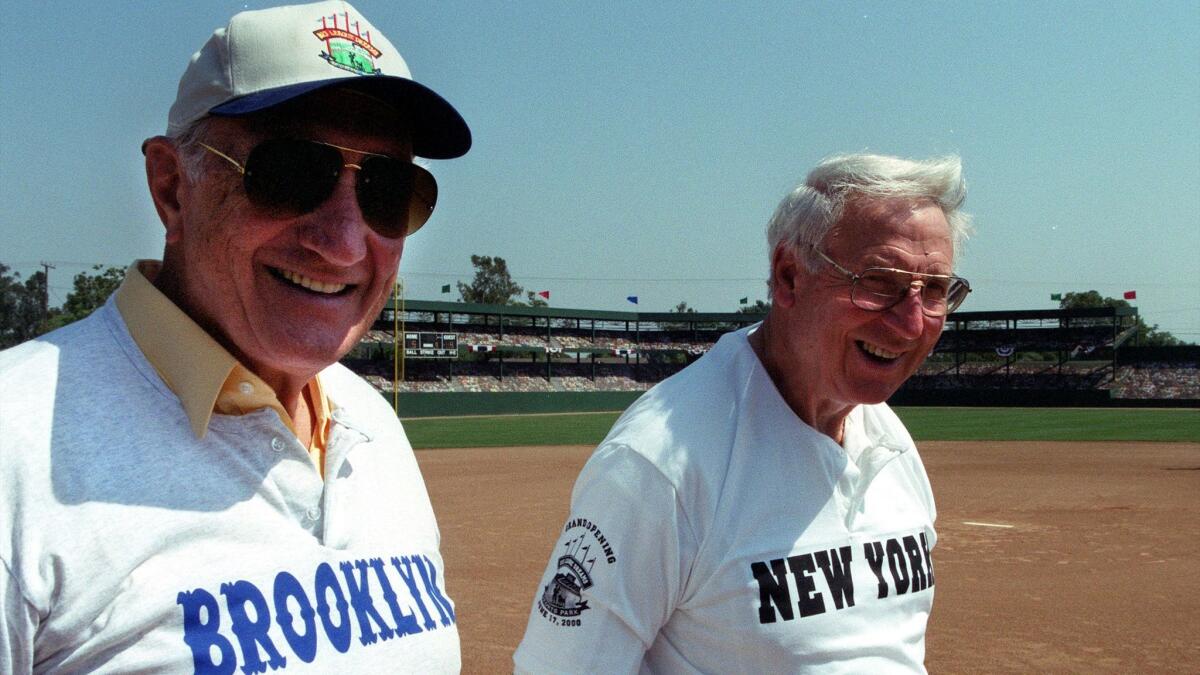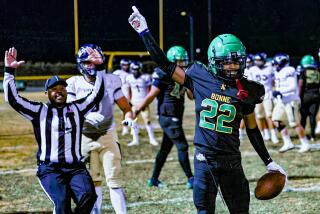Ralph Branca, Brooklyn Dodgers pitcher who gave up ‘the shot heard round the world,’ dead at 90
- Share via
Ralph Branca, the Brooklyn Dodgers pitcher who gave up one of baseball’s most dramatic home runs — “the Shot Heard Round the World” hit by the New York Giants’ Bobby Thomson in 1951 — died Wednesday. He was 90.
Branca’s son-in-law, former Dodger Bobby Valentine, announced the death on Twitter. No cause was given.
“One of the greatest guys to ever throw a pitch or sing a song is longer with us,” Valentine tweeted. “Ralph Branca passed this morning.”
A three-time All-Star, Branca won 88 games during his 12-year major league career, including 21 for the Dodgers in 1947. But the right-hander’s accomplishments were overshadowed by a game he lost — the third and deciding game of a playoff for the National League pennant and a World Series berth in 1951.
Thomson’s ninth-inning home run gave the Giants a 5-4 victory and made him a legendary figure. Branca went back to the Dodgers’ clubhouse and wept.
“Bobby was the hero, but the fellow who came out of that incident 10 feet tall was Ralph Branca,” Dodger broadcaster Vin Scully said after Thomson died in 2010. “Ralph to me carried the cross exceptionally well. After a while it had to be excruciating.”
There was no escaping the moment. “The Giants win the pennant! The Giants win the pennant! The Giants win the pennant! The Giants win the pennant! “ screamed the team’s broadcaster, Russ Hodges, in a radio call that would be replayed relentlessly over the years.
Published reports decades later that the 1951 Giants were stealing signs from the opposing catcher — and thus batters knew what kind of pitch was coming — seemed to provide Branca with a measure of vindication.
“My tongue has loosened because the truth has set me free,” Branca told the Journal News of Westchester County, N.Y., in 2001. “I don’t think Bobby understands the ramifications of what stealing signs did. They stole the pennant from the Dodger fans, still the greatest fans who ever lived. They stole the opportunity of Dodger players to go to the World Series and maybe beat the Yankees. They stole the glory and money from the Dodger owners.”
Thomson maintained that although he knew which pitches were coming the first three times he hit in the decisive playoff game, he chose not to know what Branca was going to throw when he came to the plate that final time.
“We did steal signs, and I did take some, and I don’t feel good about it. But I didn’t get the sign on that pitch,” Thomson told the Journal News in 2001. “Ralph says I did, and if that eases the burden of what he’s carried around all these years, I’m glad for that.”
Branca told The Times in 2010: “I think [Thomson] didn’t want to demean what he did, but in my mind, I think he would have been a bigger man if he admitted it.”
Despite the controversy, Branca and Thomson became friendly over the years, linked by the home run and frequent appearances for charities and memorabilia shows. “He was a good guy, was humble, never lorded it over me,” Branca told The Times. Branca blamed the Giants’ management for stealing the signs and said Thomson was “just a foot soldier.”
Ralph Theodore Joseph Branca was born Jan. 6, 1926, in Mount Vernon, N.Y., the 15th of 17 children of Katherine and John Branca. He played baseball and basketball in high school but was at first overshadowed by a teammate, his older brother, John, wrote Joshua Prager in the 2006 book “The Echoing Green.”
One of their sisters, Ann, wrote the three New York baseball teams to have the Brancas invited to tryouts. Teams were looking for players as the start of World War II depleted rosters. Branca signed with the Dodgers in 1942. His brother was drafted by the Army Air Forces.
Branca debuted with the Dodgers in 1944 and had his best season in 1947 when he won 21 games and led the team to the World Series.
“His fastball snarled, his big curve snapped,” Roger Kahn wrote in “The Era: 1947-1957” in 2002. “Young Branca had the world before him. There was not a better youthful pitcher on earth.”
But the Dodgers lost the World Series in seven games to the New York Yankees. Branca pitched in three of the games, winning one and losing one.
In 1951, the Giants and Dodgers ended the regular season tied for first in the National League. The Dodgers had been in first place for most of the season, but the Giants won 37 of their last 42 regular-season games to force the rare best-of-three game playoff.

The Dodgers lost the first game, 3-1, on Oct. 1 at Ebbets Field. Branca pitched eight innings and gave up two home runs, including one to Thomson.
The Dodgers won the second game the next day at the Polo Grounds, 10-0.
The deciding game on Oct. 3 also was at the Polo Grounds. The Dodgers led, 4-2, in bottom of the ninth inning when Branca relieved starting pitcher Don Newcombe with two runners on base.
Branca threw Thomson a fastball that was taken for a strike and planned to throw him another, hoping to set Thomson up for a curveball.
He never got the chance. Thomson hit the second pitch over the left-field fence.
Branca wrote about the game and the aftermath in his 2011 memoir “A Moment in Time.”
“I was a good pitcher, but I was only known for throwing Thomson that home run pitch,” Branca said in a 2014 interview with Lindsay Berra, a columnist for Major League Baseball’s website. “That gave me notoriety. People say I became famous, but I say I became infamous.”
The following spring, Branca injured his back and was never the same pitcher. He was acquired by the Detroit Tigers in 1953 and learned from a new teammate who had played for the Giants about their elaborate system of stealing signs.
Branca won only 12 games after Thomson’s home run. He also pitched for the Yankees before briefly returning to Brooklyn in 1956. He was out of baseball at age 30.
Branca worked as an insurance agent and financial planner after he retired from baseball. He was the first president of the Baseball Assistance Team, which was started to assist former major leaguers who needed financial, medical or other types of help after their careers had ended.
“My only regret,” Branca told The Times in 1974, “is that I wasn’t able to pitch effectively after that ’51 season, that I wasn’t able to show people that the home run didn’t affect me.”
Thursby is a former Times staff writer.
MORE OBITUARIES
Longtime Los Angeles sports reporter Joe Resnick dies at 62
Star maker Milt Okun, who brought John Denver and Placido Domingo together, dies at 92
Los Angeles music writer, proto-punker and sharp dresser Don Waller has died
More to Read
Go beyond the scoreboard
Get the latest on L.A.'s teams in the daily Sports Report newsletter.
You may occasionally receive promotional content from the Los Angeles Times.










